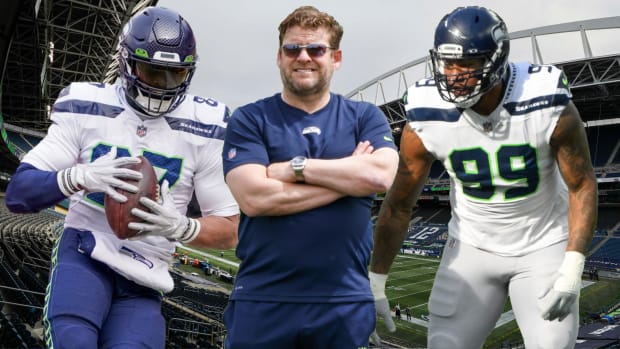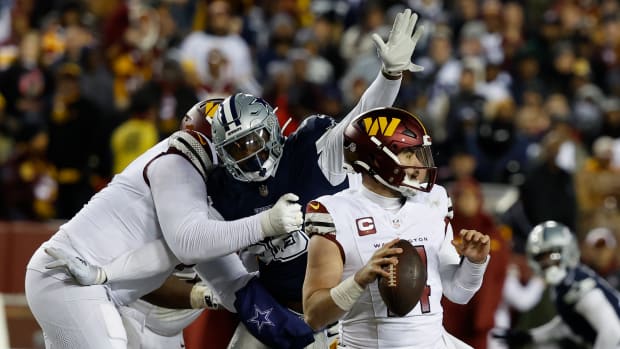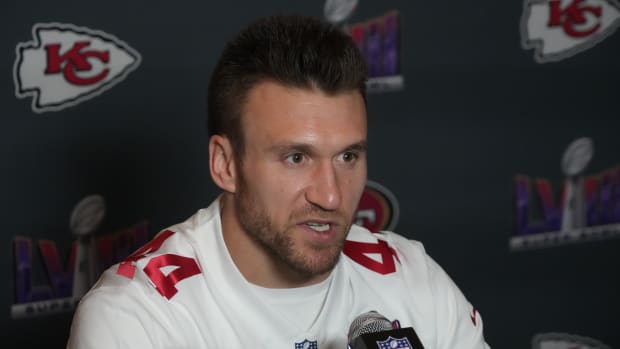The American Dream
Undrafted free agent Nate Boyer, 34, is trying to make the Seahawks as a long-snapper. (Ted S. Warren/AP)
By Nate Boyer
When Peter King asked me to guest-write the MMQB column during July 4 week, I was honored. That was immediately followed by worry, then panic. What was I going to say? My story has already been told by many accomplished sportswriters. What could I possibly add?
And then I thought about Shia LaBeouf.
[youtube https://www.youtube.com/watch?v=nuHfVn_cfHU]
“DO IT! Just DO IT! Don’t let your dreams be dreams. Yesterday you said tomorrow, so JUST DO IT! MAKE, YOUR DREAMS, COME TRUE! Just DO IT! Some people dream success while you’re going to wake up and work HARD at it! NOTHING IS IMPOSSIBLE! You should get to the point where anyone else would quit, and you’re not gonna stop there. No. What are you waiting for? DO IT! JUST, DO IT! Yes you can! Just do it! If you’re tired of starting over? Stop, giving, up.”
Over the past month many have poked fun at the actor's words. He’s been called crazy for saying them. But in my mind, Shia LaBeouf’s monologue (part of a collaboration project with fine-art students in London) includes some of the sanest advice I’ve ever heard. Those who ridicule LaBeouf will go on living their safe, relatively riskless lives. They will enjoy freedom that very few of them fought for. They will just exist—surviving, but not thriving.
This is what hurts me about America.
The MMQB 100
Introducing The MMQB’s ranking of the most influential figures for the 2015 season. THE LIST SO FARNos. 51-60: On his third coach and fifth coordinator in Chicago, Jay Cutler has one last chance to make it work with the Bears. Plus, DeMarco Murray, Cam Newton, Jeffrey Kessler and more. FULL STORYNos. 61-70: Junior Seau will be inducted into the Hall of Fame this summer. His life and untimely death contain lessons that every professional athlete must learn. Plus, Jason Garrett, Darrell Bevell, Cris Collinsworth and more. FULL STORYNos. 71-80: Like Winston and Mariota last year, Michigan State’s Connor Cook, the presumptive 2016 top QB prospect, will loom over the NFL season. Plus, Jimmy Haslam, Colin Kaepernick, Todd Gurley and more. FULL STORYNos. 81-90: After a crushing NFC title game loss, Mike McCarthy takes on a different role. Plus Jim Harbaugh, Khalil Mack, Eli Manning and more. FULL STORYNos. 91-100: Rachel Nichols is a thorn in Roger Goodell’s side. Plus, Richie Incognito, Le’Veon Bell, John Elway and more. FULL STORY
This Independence Day I pose one simple question: What is your American dream? If you aren’t pursuing what you love, then you are crazy, not Shia LaBeouf. Crazy is ignoring what you’re passionate about because it seems too hard, or out of reach. Crazy is being afraid of failure. Crazy is working a job you hate because you think you don’t have a choice. In this country, no matter who you are or where you came from, we all have a choice. If you choose to make excuses, then so be it. If not, America needs you to start living the life you dream about. America might be the greatest country in the world, but Americans can be the most frustrating people in the world at times.
Most of you were probably born in America, or somewhere else in the free world. It’s a privilege—one that comes with responsibility. It is your duty to follow your heart. Doubt will creep in, and people will say you can’t do something because they can’t do it, or they’re jealous, unhappy or whatever. Don’t listen to them. Listen to Shia LaBeouf.
The biggest obstacle that stops us from achieving our dreams is placing additional limits on ourselves. Why would we do that? Why make things harder than they already are? I didn’t always look at things like this. I had to run away from what was familiar and comfortable. I had to take a long, hard look in the mirror and make the decision to change the way I attacked life. For me, it took a journey to a place I knew nothing about. It took a trip to the Darfur.
* * *
I am a 34-year-old rookie long-snapper currently with the Seattle Seahawks. I signed as an undrafted free agent directly following the 2015 draft. In 2004, I enlisted in the United States Army and earned a green beret in 2006. Following a deployment to Iraq in 2008-09, I decided to follow my dream of playing college football—despite never playing a snap of football in my entire life. In 2010 I enrolled at the University of Texas and walked on to the football team. I remained in the Special Forces through the Texas National Guard and went back overseas every summer between spring football and training camp. In 2013 and 2014, I deployed to Afghanistan and returned the day before training camp to trade in my Kevlar and body armor for a football helmet and pads. The first time I ever long-snapped a football was at the age of 31, and I was fortunate enough to start for the Longhorns over the subsequent three seasons. Peter King already has written about my story, and what follows is my account of how it all began.
* * *
Che Guevara was 23 years old when he set off on a journey across South America. The Motorcycle Diarieschronicles Che’s travels and how the world changed him as a man. Although I don’t necessarily agree with his politics (or anyone’s for that matter), what inspired me was his commitment and his passion for what he believed was the right thing to do, and the right way to live. Even though he grew up in affluence, attended medical school and was set to become a doctor, being alone on the road humbled Che. He found something he believed was truly worth fighting for.
In 2004, I was also 23. Although I worked with kids diagnosed with autism, I felt empty and unfulfilled. I was just floating through life with no direction, no greater purpose, and no idea what the hell I really wanted. Money and material possessions never meant anything to me, and I had no dream to pursue. I had nothing to fight for.
Then Time published the article “The Tragedy of Sudan.” It electrocuted my soul. I was captivated by the pain and atrocity of the genocide. James Nachtwey’s photographs made me ache inside like I never had before.
I called every Non-Governmental Organization (NGO) in the Darfur. I told them I would pay for my flight and all my expenses. I offered to build refugee camps, dig ditches or wells. I would do anything to help. One by one, I was turned away because I didn’t have a college education. “No,” I was told, again and again. “I’m sorry, but it’s just not possible.” Maybe these were just the words I needed to hear. Something stronger than my body was tugging at my soul, and when you get a feeling like that, you just can’t ignore it.
I went to the public library and did research. I made dozens of phone calls. I applied for a travel visa from the Consulate of Chad (which neighbors Sudan to the West) and it arrived in the mail a few days later. I booked a ticket to the capital, N’Djamena.
The Darfur transformed me. It broke me from my extended boyhood, and rebuilt me into a man on a mission. At times, I felt guilty for being American. I grew up with privilege and didn’t earn any of it.
Maybe the hardest part of this whole process was telling my mother. She was already worried about me, and this would be difficult on her. I remember sitting with her and my father at dinner and prefacing what I was about to tell her with “there’s something I need to tell you guys, but first I need to use the restroom.” This was the ingenious plan I devised to lower the shock value. It did not have the intended effect. She calmly digested the information and then asked if I had a death wish. She would pray about me constantly just as she always had and always will, and I’m pretty sure it works every time.
I didn’t pack much: just a change of underwear and socks, my toothbrush, malaria pills, and a copy of The Motorcycle Diaries. I wore a plain white T-shirt, old khakis, black “ninja” slippers and a red wine-stained seersucker coat.
The moment I touched down in N’Djamena I was overwhelmed. Nearly everyone was dressed in traditional Muslim attire, and the single-gate “airport” was loud and chaotic. It smelled like hot garbage, and almost no one spoke English. I landed in the middle of the night and spent the wee hours finding out when the United Nations High Commission for Refugees (UNHCR) flight left for the refugee camps in the eastern part of Chad bordering the Darfur region. I had no idea how in the world I would get on the plane.
The NFL's Most Improbable Prospect
Nate Boyer is a 34-year-old long-snapper with a football dream and a life story made for Hollywood. Meet the Green Beret training voraciously for his NFL opportunity. FULL STORY
At 5:30 a.m., a Chadian man with a clipboard and the flight’s manifest arrived at the terminal. I approached him with confidence and a cover story I was absolutely committed to. I knew it was wrong to lie, but my intentions were genuine.
I said I worked for the NGO Doctors Without Borders but had been robbed in Paris of identification and documentation, and my contact was waiting for me in Abéché (a village across the country and the headquarters from where the NGOs deployed their volunteers). I guess he believed me because the next thing I knew, I was flying over the Sahara in a twin prop plane. Looking out the window, I was overwhelmed by how vast, empty and beautiful the landscape was: endless sand dunes and the deepest horizon you could imagine. Once in a while I would see a villager leading a herd of camels, or an old Russian tank left rusting in the midst of desolation.
After arriving in Abéché I was directed toward the Doctors Without Borders compound, and headed that way on foot. After using much “pointy-talky” communication, I arrived and was led by armed soldiers to a tent. A few minutes later, a large French-Canadian man stormed into the tent in a rage. He rifled through my bag and shouted. How did you get here? Who do you work for? He thought I was CIA or some sort of mercenary. I calmly explained why I was there, and after an hour of barking he became empathetic. He connected me with the Catholic Relief Services and Child Fund, and I would work with them for the next two months.
The Darfur transformed me. It broke me from my extended boyhood, and rebuilt me into a man on a mission. Those people shook me to life. Their generosity, love and care for a total stranger from a far-off land left me in awe. I spent most of my days with orphaned children. Many had witnessed their father’s murder, their mother’s rape, their villages burning to the ground. At times I felt guilty for being American. I grew up with privilege and didn’t earn any of it.
How could these kids, many with missing limbs or maimed faces, be so happy all the time? Simply kicking a soccer ball around or watching a red-bearded American guy try his hand at Double Dutch made them laugh uncontrollably. Those smiles, much like the traumatic photos from that Time article, will never be erased from my memory.
What I took away from the Darfur (along with a weeklong bout with Malaria) was a newfound patriotism. It wasn’t because I thought America was so much better than this place; it was because of how those people viewed America, and more importantly, how they viewed Americans. Refugees and local villagers wanted to hear stories of America, and in turn I got to hear how they loved what we stood for as a nation. Politics and imperfections aside, for the first time I was truly proud to be an American. There were even young men who told me if they could join they American military they would. They understood that we are sometimes the only country that will intervene when a poorer nation faces oppression of some kind. One night, one of the village elders slaughtered a goat in my honor, and we had a feast as I got to hear about each of these people’s version of the American dream.
At 5-10 and 225 pounds, Boyer is undersized as a long-snapper and is considered a longshot to make the Seahawks roster. (Elaine Thompson/AP)
I live differently now. Whatever motivates or moves me, I explore and seek out. I may not always like it in the end, but I wasn’t going to live my life with regret, because regret is just about the only thing I truly fear.
I remember lying under the stars in the Darfur and listening to the BBC on a transistor radio. Getting a play-by-play of what was going on in Fallujah stirred something else inside me, a desire to fight for those who can’t fight for themselves. That journey to Africa set in motion a course of events that led me to Iraq and Afghanistan, to walk on at Texas while continuing to serve my country, and now to an incredible opportunity with the Seattle Seahawks. But this is only the beginning to my American dream, and I’ll probably never stop pursuing it. It’s what makes me happy.
So, thank you Shia LaBeouf. You literally screamed out loud the way I feel about Americans and the American dream. I'd like to join my new hero and ask that you to seek out your American dream, if you’re not already doing so. You don’t have to go to Africa or even across the county line. Just do it. Make your dreams come true.
To earn a job with the Seahawks, Boyer will have to beat out veteran Clint Gresham, Seattle's long-snapper since 2010. (Ted S. Warren/AP)
10 Things I Think I Think
1. I think everyone has the capacity for greatness. It’s just a matter of whether you’re willing to make the necessary sacrifices to achieve great things. There is literally nothing special about me. I’m a good athlete, not a great one. I’m smart, but I’m no genius. I can figure things out, but I’m not a fast learner. All I do is make the choice to outwork everyone around me. That doesn’t take a special person; it just takes ambition, effort and commitment.
The MMQB: Guest Writers
While on vacation, Peter King has handed the keys to his Monday Morning Quarterback column to a series of guest columnists. King will return on Monday, July 13. Robert Klemko: On Charleston, Rob Gronkowski and the Steelers’ successful bust. FULL STORY Jenny Vrentas: On Carson Palmer, Mike Tannenbaum and inside HBO’s new show. FULL STORY Greg Bedard: On patriotic footballers, Tom Brady and the NFL’s non-drug problem. FULL STORY
2. I think everyone has the ability to make a huge difference in other people’s lives. There is something substantial that you could do right now to help another person. It probably doesn’t cost anything except maybe a little bit of your time and giving a damn. Just showing up is usually half the battle.
3. I think 22 veterans a day killed by suicide is just about 22 too many. Men and women who served our country have done one of the most honorable things you can do on this planet. It’s not always what we experienced in combat that can make the transition difficult. It’s feeling like you’ll ever do anything again that mattered as much as serving. If you want to know how to get involved, start by visiting the website 22 Kill and find a way to help a veteran. Sometimes we need a hero too.
4. I think you should never wait until tomorrow to do what you’re fired up about today. Don’t let the flame have a chance to burn out with a good night’s rest. “Let me sleep on it” is code for “let me find a way to make excuses for why I shouldn’t do it.”
5. I think we’re on the right track. The ideas and way of life that this nation was founded on are very much alive and well. We might not always show it, and clearly there is room for vast improvement, but Americans inspire me almost every day when I see what we are capable of.
6. I think Jim Valvano’s speech at the ESPYs will literally move me to tears every time I watch it for as long as I live. “If you laugh, you cry, and you think, that’s a full day, that’s a heck of a day.”
7. I think you can make your luck, and I am very lucky.
8. I think football and war have more in common than I originally thought they would. Obviously the stakes are higher on the battlefield, but a successful team in both venues fights for the man on their left and right. There are strong brotherhoods that are born out of both. The differences stem from when people try to compare combat to the gridiron; those should never be in the same discussion.
9. I think you should try things. Everyone should spend an extended period of time outside his or her comfort zone. There is much more to life waiting for you beyond the bubble you’re living. We all forget this on a daily basis, and it’s not our fault, just a byproduct of the culture. The world is waiting for you to get involved. If you don’t know what you like or what drives you, then just try things. You’ll find passion if you’re seeking it.
10. I think the only thing I know for sure is that I know nothing at all. Plato credits Socrates with saying something like this a couple thousand years ago. As far as I know, these were some pretty smart dudes. I try to remember to live by this everyday of my life. You can learn something valuable from any person and any situation. At least, I think you can.
Follow The MMQB on Facebook, Twitter and Instagram.
[widget widget_name="SI Newsletter Widget”]














































